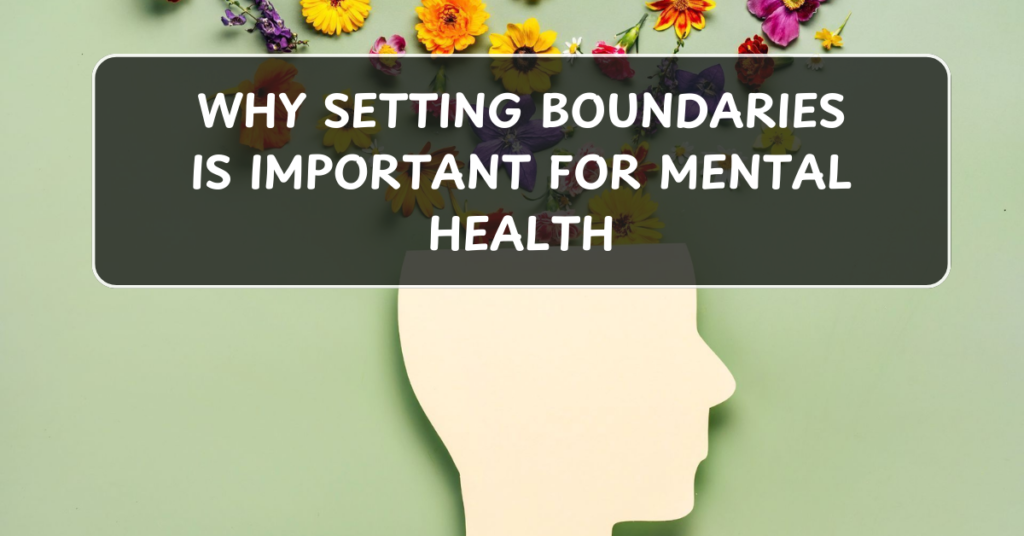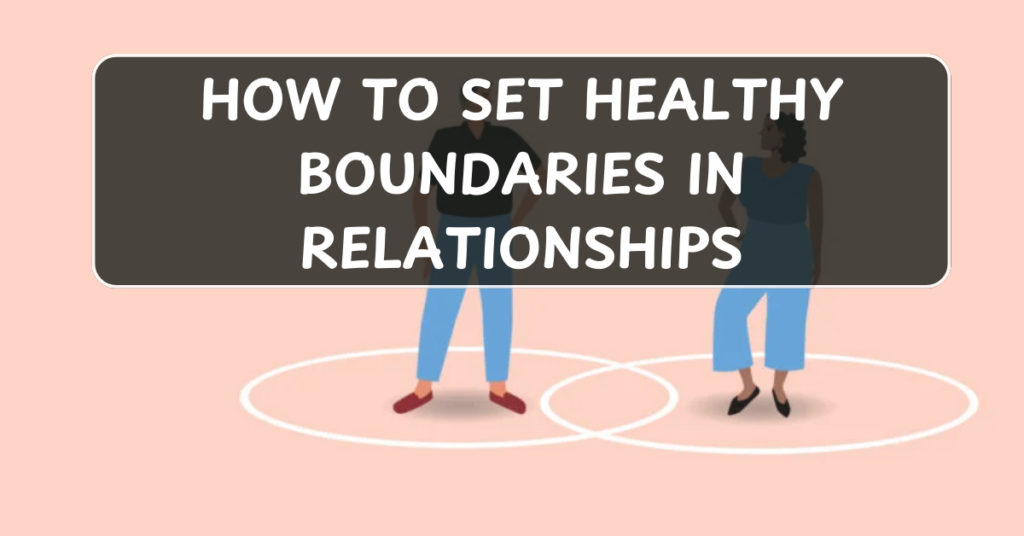
Setting boundaries is one of the most powerful tools for maintaining mental well-being. In today’s fast-paced and often overwhelming world, it’s easy to lose track of your needs and priorities. Whether in relationships, at work, or within your own family, boundaries serve as an essential way to protect your mental health, foster respect, and create space for personal growth. Here’s why setting boundaries is so crucial for your mental health:
1. Prevents Overwhelm and Burnout
One of the biggest threats to mental health is burnout. Without clear boundaries, it’s easy to take on too many responsibilities, neglect your own needs, and become overwhelmed by the demands of others. When you set healthy boundaries, you take control of your time and energy, allowing you to focus on what’s truly important without feeling drained.
- Example: Saying no to extra work when you’re already feeling stretched thin, or refusing invitations to social events when you need rest, prevents overcommitting and the stress that can follow.
2. Protects Your Emotional Well-being
Emotional boundaries allow you to manage your feelings and prevent emotional overload. When you set boundaries, you’re better able to regulate your emotions and avoid absorbing the negative energy or stress of others. You create space for emotional resilience, making it easier to navigate challenging situations without getting overwhelmed or exhausted.
- Example: Telling someone that you don’t want to talk about a sensitive subject, or stepping away from a conversation that feels emotionally draining, helps protect your emotional health.
3. Increases Self-Respect and Self-Worth
Setting boundaries is a clear demonstration of self-respect. When you establish limits, you’re essentially saying, “I value myself and my needs.” This fosters a positive self-image and reinforces your sense of worth. Knowing that you have the power to control how others treat you strengthens your confidence and promotes a healthy relationship with yourself.
- Example: Communicating to others when their behavior is unacceptable or standing firm on your needs creates a sense of empowerment and reinforces that you deserve respect.
4. Enhances Relationships and Reduces Resentment
Healthy boundaries lead to healthier relationships. When you communicate your limits clearly, it reduces misunderstandings and prevents resentment from building up. Respecting each other’s boundaries creates mutual trust, allowing relationships to thrive in a space of mutual understanding and respect. Without boundaries, relationships can become toxic, with one person consistently overstepping the other’s needs.
- Example: In a friendship, setting clear limits on how often you’re available or what you’re comfortable discussing fosters an atmosphere of trust and reduces unnecessary tension.
5. Supports Personal Growth and Independence
Setting boundaries enables you to carve out time and space for personal growth. It allows you to invest in your own interests, hobbies, and goals without feeling guilty for taking time away from others. This fosters independence, self-development, and a greater sense of fulfillment in your life.
- Example: Allocating time for hobbies, exercise, or education, and communicating your need for this time to others, helps you focus on your personal growth without feeling selfish or unproductive.
6. Reduces Stress and Anxiety
When you don’t set boundaries, you might find yourself saying yes to things out of obligation, guilt, or fear of rejection. This creates stress and anxiety, as you’re constantly worried about how to juggle responsibilities and obligations. Setting boundaries helps you manage expectations and ensures that you’re not constantly overburdened, which in turn reduces feelings of anxiety and stress.
- Example: Saying no to extra tasks at work or turning down social engagements that add to your stress helps you maintain a sense of balance and peace.
7. Prevents People-Pleasing Behavior
Constantly trying to please others at the expense of your own well-being is a form of self-neglect that can lead to resentment, exhaustion, and low self-esteem. Boundaries help break the cycle of people-pleasing by allowing you to say no, prioritize your needs, and make decisions that align with your values, rather than constantly trying to satisfy everyone else.
- Example: Rather than agreeing to every request or invitation, setting boundaries enables you to make decisions based on your own needs and desires.
8. Encourages Healthy Communication
Setting boundaries promotes clear and respectful communication. When you know your limits and communicate them effectively, it creates an open dialogue that prevents misunderstandings and conflict. Healthy communication is the foundation of any strong relationship, whether personal or professional, and boundaries are a key part of that communication.
- Example: Clearly communicating that you need time to yourself after a long day allows others to understand your needs without assuming you’re being distant or unkind.
9. Helps You Cope with Conflict
Having boundaries in place helps you navigate conflict more effectively. When you have clear personal boundaries, you can handle disagreements with more calm and confidence, because you’re not afraid of losing yourself or your sense of control in the process. Boundaries help you assert yourself in conflicts without fear of being overwhelmed or compromising your own needs.
- Example: In a heated argument, calmly asserting your stance and expressing your needs helps you avoid losing your emotional center while still addressing the issue at hand.
10. Boosts Overall Mental Health
At its core, setting boundaries helps you maintain a sense of control over your life, which directly benefits your mental health. Knowing where your limits are and acting on them promotes a balanced lifestyle, improved emotional well-being, and a greater sense of purpose. Boundaries create a foundation of self-care, which is essential for maintaining mental health and overall happiness.
- Example: Consistently setting aside time for self-care, like taking breaks, practicing mindfulness, or engaging in activities that bring you joy, boosts your mood and keeps your mind healthy.
Conclusion
Setting boundaries is essential for protecting your mental health, enhancing relationships, and fostering self-respect. By establishing clear boundaries, you’re investing in your well-being and ensuring that you have the space and energy to live your life on your terms. Boundaries aren’t selfish; they’re an act of self-care that allows you to maintain balance, reduce stress, and promote personal growth. So, start setting those boundaries today – your mental health will thank you!


